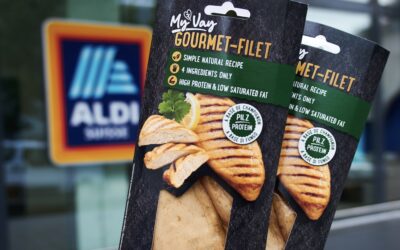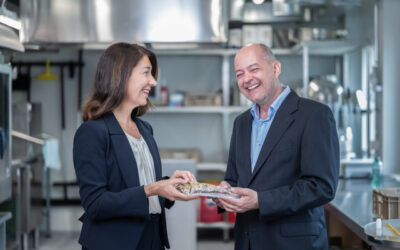Impact Digest | Ultra-processed foods: myths, facts and future role

Nearly 29% of the global population experienced moderate or severe food insecurity in 2023. As the world population grows, we don’t only need to consider food availability – we need to find new solutions to ensure that everyone has access to a nutritionally complete diet too.
Building on a fascinating discussion as part of Food Day @ETH, on the 11th of November, we brought together four expert speakers to discuss the complexities of food processing and its impacts on health and the environment. Read on to discover what we learnt.
Key Takeaways
We need more clarity: There is no clear legal definition of UPFs and the NOVA classification system has significant limitations. The definition and wording should also reflect the focus of the discussion. If we’re talking about health, we should speak about “unhealthy processed foods”. If we’re talking about the amount of energy required to create a product, we should talk about “energy intensive processed foods”.
We must view a product’s impact holistically: To drive better social, environmental, and economic outcomes, we need to balance multiple goals along the value chain, including access to safe and nutritious food, efficiency in resource management, and equitable livelihoods.
We need innovation to drive healthier formulation: Reformulating processed food can be a powerful lever for creating healthier food options – and industry can be a key part of the solution through responsible product development.
Dr. Martin Michel, Expert & former Nestlé
Martin discussed food processing in the context of food systems, emphasising its role in value chains. He highlighted the primary goals of food processing: food safety, preservation, sensory aspects, nutrition and health, sustainability, and food diversity.
He also briefly discussed the NOVA classification system and its limitations, pointing out that ‘ultra-processed food’ is ill-defined, and the classification conflates composition, number of ingredients, and processing techniques. Many foods classified as “ultra-processed” are also characterized by high energy density, elevated levels of saturated fats, sodium, and/or sugars, while being low in dietary fiber, all of which are independently linked to negative health outcomes.
Martin also highlighted that collaboration between stakeholders is vital to address potential trade-offs based on systems perspectives, scientific data, and risk-benefit analysis.
Niels Jungbluth, Manager & Owner, ESU-services GmbH
Niels introduced the life cycle assessment (LCA) methodology, which considers the environmental impact of a product from ‘cradle to grave.’ All inputs and outputs are balanced according to the defined system boundaries and functional units. LCA is not an absolute measurement; it compares different situations and products.
When analysing food consumption, the level of food processing (e.g. for UPFs) is not a major factor when assessing its environmental impact. The most significant factor in an LCA is usually if the product is of animal origin, due to the environmental impact of agricultural production. Transport, packaging, food waste, processing, cooling, and preparation play a minor role.
Niels highlighted the importance of new policy measures to allow a broader acceptance of plant-based products.
Sophie Hofer, Product Manager, Planted
Sophie discussed Planted’s approach to product development, highlighting their commitment to creating clean-label plant-based meats that are packed with protein, fiber and essential micronutrients such as Vitamin B12. She emphasised that Planted meats seamlessly fit into a healthy, balanced diet, challenging the negative reputation often associated with processed foods.
Sophie stressed that not all processed foods are created equal and that the formulation plays a crucial role in determining a product’s nutritional quality. She called for a differentiated approach from media and other opinion leaders when discussing highly processed foods. The current generalized perception often overlooks the nuances between products and their formulations. A more balanced perspective, based on facts rather than broad categorizations, is essential to help consumers understand the potential benefits of thoughtfully designed products in fostering both personal and environmental health, rather than grouping all processed foods together as “high in sugar, high in fat, and high in salt.”
She further highlighted the significant environmental benefits of Planted’s offerings compared to traditional animal meat with up to 97% Co2 emission savings and addressed the challenges of accurately classifying plant-based alternatives within the NOVA system.
Mélanie Douziech, Scientific Collaborator, Agroscope
Mélanie presented research results on meat and dairy alternatives’ nutritional and environmental impacts. She pointed out that while meat alternatives generally have lower environmental impacts, dairy alternatives may potentially have some negative impacts on both the environment (due to possible increase in water scarcity and freshwater eutrophication) and health (due to possible insufficient levels of calcium and iodine if the product isn’t fortified).
She highlighted that processing can improve the protein quality and bioavailability in soy-based meat alternatives and that there is no clear trend between processing and environmental impacts.
Moving closer to a future-proof food system
The event highlighted the complexity of defining and regulating UPFs and the need for consumer clarity when it comes to innovative products that do not fit neatly into the existing categories of the NOVA classification. By taking a more holistic view of the impacts of their products, food producers can optimise their formulations and offer consumers choices that make healthier and sustainable diets more accessible. Thanks to everyone who joined us!
Hungry for more?
Latest News
planetary scales B2B ingredient sales as ALDI Suisse selects Libre® mycoprotein for product launch
Planetary SA (“planetary” or the...
Yumame Foods and Le Patron partner for a delicious, plant-based future of food
Valley partner Yumame Foods and the...
What the food industry can learn from GDI’s Major Shifts model
The future is coming faster than many...
Meet the finalists of the Igeho Rising Star Award for 2025
Many startups applied. 15 made it to...




